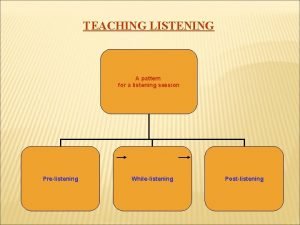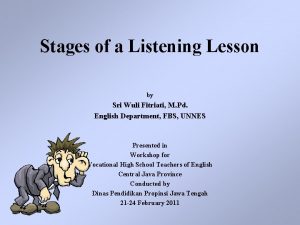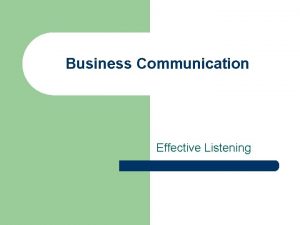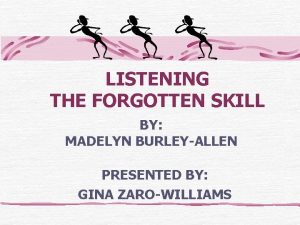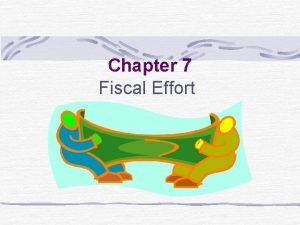Listening Art or Skill Listening requires effort concentration









- Slides: 9

Listening Art or Skill ? Listening requires effort & concentration. Robert G. Cole Jr. Sr. H. S. Barbara Lien 1 3/10/2021

Two Kinds of Listeners PASSIVE: all the responsibility for successful communication lies with the person doing the talking. 1. Causes us to be “lazy”. 2. The talker does “all” the work. ACTIVE: effective listeners play an active role by guiding the talker with feedback and thinking. Robert G. Cole Jr. Sr. H. S. Barbara Lien 2 3/10/2021

Hearing is not Listening! When you “Listen”, you think. That’s why you’re tired out after a long lecture where notes were taken. When you listen, you intercept a message and translate it. When you “hear”, no direct interception or translation or comprehension of the message takes place, more of a sensing what was said. Robert G. Cole Jr. Sr. H. S. Barbara Lien 3 3/10/2021

Advantages: l Stay out of trouble l More up to date l Improve relationships with friends l Increases knowledge Robert G. Cole Jr. Sr. H. S. Barbara Lien 4 3/10/2021

Why we listen? INFORMATIVE : The most common reason to listen, 45% to 90% of the time in school is devoted to listening for information (28 minutes out of every 60). l ENTERTAINMENT/Relax/Appreciative: For enjoyment, relaxation, and fun – music, conversation, radio, etc. l CRITICAL: To analyze or compare – to deal with cause and effect situations l DELIBERATE: To judge or evaluate – to be able to draw a conclusion l 5 3/10/2021

Why We Listen? DISCRIMNATIVE: used to single out one particular sound in a noisy environment. EMPATHIC: encourages people to talk freely without fear of embarrassment, “sounding board” Robert G. Cole Jr. Sr. H. S. Barbara Lien 6 3/10/2021

Why we don’t listen? It’s hard work. We’re lazy! l We want to be entertained. l We’re too tired or hungry. l We’re impatient and tune out when we don’t understand something. l We want to interrupt and speak, instead of listening. l We yield to distractions. Internal (with in the mind) l 7

Listening Tips * Get enough sleep, and eat healthy meals. l Work at it. * Don’t yield to “any” distractions. l Take notes. * Don’t talk! Robert G. Cole Jr. Sr. H. S. Barbara Lien 8 3/10/2021

Interesting Facts! 1. People can speak comfortably at 120 to 180 words a minute. 2. People have the ability to listen six times faster than they speak. 3. “Listening Spare Time”: we sandwich our own thoughts between the ideas of a speaker – internal distraction at times. Robert G. Cole Jr. Sr. H. S. Barbara Lien 9 3/10/2021
 Pre listening while-listening and post listening examples
Pre listening while-listening and post listening examples While listening stage
While listening stage Concentration gradient vs concentration difference
Concentration gradient vs concentration difference Movement of high concentration to low concentration
Movement of high concentration to low concentration Types of skill
Types of skill 李典憲
李典憲 Active listening in business communication
Active listening in business communication Listening the forgotten skill
Listening the forgotten skill Ap concentration examples
Ap concentration examples Active vs passive listener
Active vs passive listener
